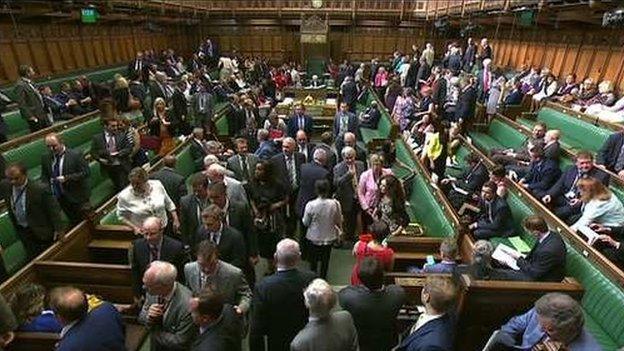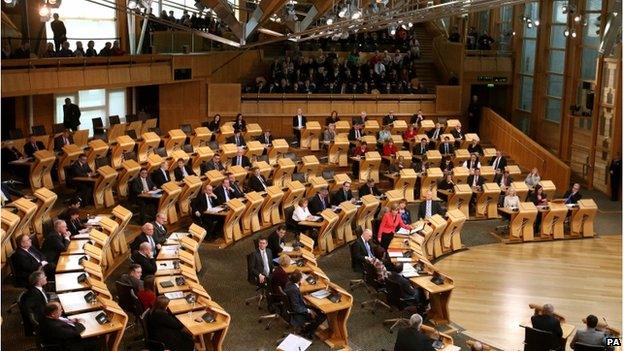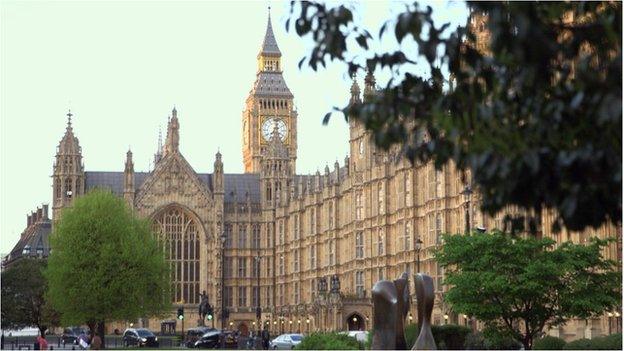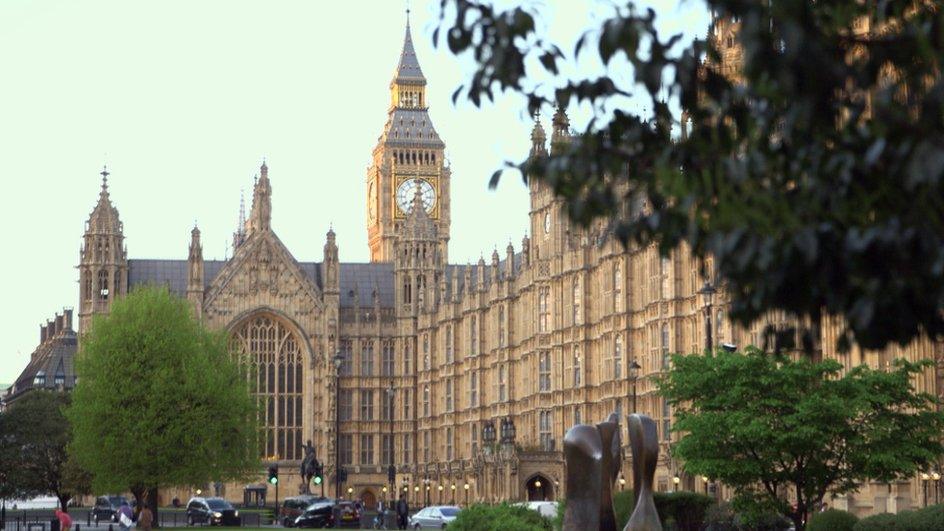MPs say Scotland Bill calls are being 'ignored'
- Published

This was the third day of debate on the Scotland Bill
The Scottish secretary has dismissed accusations that UK ministers are not listening to those who want the Scotland Bill strengthened.
It follows complaints in the Commons and a letter from Deputy First Minister John Swinney suggesting that Scottish proposals are being ignored.
The government has again won a series of Commons votes - ignoring calls for the legislation to be amended.
The third day of debate has been focusing on welfare powers.
As with Monday's debate on taxation Scottish Secretary David Mundell insisted that the Scotland Bill lives up to the spirit of the Smith Commission's recommendations.
'Resisted all amendments'
The SNP and Labour backed each others calls for Holyrood to have unrestricted power to create new benefits and top up existing ones -as well as seeking other changes.
But despite a written complaint from the Scottish government that calls from Scottish MPs were being resisted, Mr Mundell said he was listening and would reflect before the next stage of the bill's parliamentary progress later this year.

MPs are deciding which additional powers will be given to the Scottish parliament
Mr Mundell has previously said the UK government would not back any amendments to the Scotland Bill, external that were "bad for Scotland".
The bill will give further control to the Scottish Parliament over taxation, VAT revenues and welfare.
Mr Swinney said that during the previous day's committee stage of the legislation on taxation the UK government had "again resisted all amendments, whatever their support amongst MPs from Scottish constituencies".
The deputy first minister quoted Mr Mundell's response to the SNP MP Tommy Sheppard, when he cited evidence of "productive discussions" with Mr Swinney and his willingness to address issues raised by Holyrood's Devolution (Further Powers) committee.
Mr Swinney said: "There will have to be clear movement by the UK government otherwise it is becoming harder to justify that description."
Top-up payments
Meanwhile, Labour's shadow Scottish Secretary Ian Murray said Scotland would be able to mitigate Conservative cuts to tax credits or other welfare under Labour and SNP plans to give Holyrood the power to create new benefits and top up existing payments.
Mr Murray said Labour amendments to the Scotland Bill, some of which are backed by the SNP, would effectively give the Scottish Parliament the power to design its own welfare system.
If MPs pass the proposals in the Commons, Scotland would be able to therefore create additional benefits to lessen the effect of welfare cuts by the UK government, for example reported Tory plans to cut tax credits, Mr Murray said.
Moving a series of amendments, the Labour frontbencher said: "There would be an ability to create a system that allowed you to mitigate the reduction in tax credits.
Mr Murray said that Labour's amendments would implement the recommendations of the cross-party Smith Commission in spirit and in substance while ensuring the welfare state remains UK-wide and allows the pooling and sharing of resources across the union.
He added: "I want to be clear that fundamentally our amendments will ensure that the Scottish Parliament has the unrestricted power to create any new benefits in areas that are devolved, in addition to the guarantees of the UK benefits and pensions system and the power to top up any benefits that remain reserved to this parliament."
'Sharing risks'
Mr Mundell said that MPs must respect the referendum result and accept that people in Scotland voted to remain part of a United Kingdom where there's benefit from sharing risks and resources with all other parts of the UK.

He said: "The fact that no Scottish MP has tabled an amendment to devolve UK pensions speaks volumes. It tells us that even the supporters of independence accept there are parts of welfare where it makes sense to share resources and risks with the rest of the UK.
"It is clear that pensions are safer and more affordable if we work with everyone else in the UK and that it would be wrong to devolve UK pensions.
"MPs have to respect the referendum result where people in Scotland voted to remain part of a United Kingdom and hold on to the benefits of being part of the UK.
"Looking after people in Scotland who are retired, unwell or out or work is now a shared space where the UK and Scottish governments need to work together."
- Published30 June 2015
